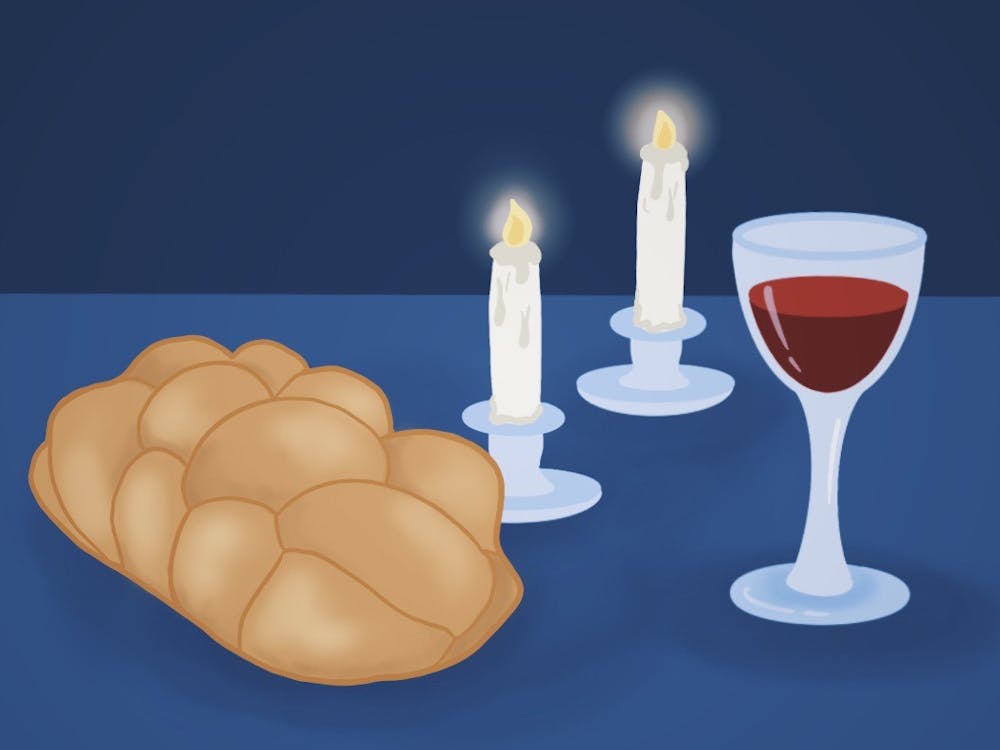A congregation forms on a Friday night under a brightly-lit synagogue, reciting and singing aloud hymns and prayers that toast to a hard week’s end.
An hour service of Hebrew readings is then reconciled by a relaxing dinner of matzah ball soup, gefilte fish, latkes and brisket. But this isn’t before additional blessings are conducted over the glass of wine and slice of challah bread consumed before the main course.
The next morning, a second service commences as congregates are reminded of lessons in the Torah and the work of the prophets in the Nevi’im, passages from the Tanakh — the Jewish holy scripture. The day of prayer is brought to an end by another service in the afternoon, celebrating more of the Torah.
This day of Sabbath — better known as Shabbat — is a biblical tradition that holds great weight to observers coming from all branches of the Jewish community.
The Tanakh notes the creation of the universe, the Earth and mankind within a six-day period — God taking the seventh day to rest.
A full day’s celebration of completing a laborious week became a staple of Jewish tradition, occurring every week on Friday’s sundown and ending on sundown Saturday when the lights go out for bedtime.
Although a holiday typically is observed at home in the company of family, Shabbat has become an important campus tradition of UF Jewish students’ lives — fostered by Jewish leaders, students and other observers. This common practice has allowed UF Jewish community members to surround themselves with each other and embrace their common heritage.
Nicole Buenavida grew up in Venezuela where she was surrounded by a vibrant Jewish community. Despite not being a consistent observer of Shabbat throughout her childhood, she always knew the day to be a celebration with a small, tight-knit group of family and friends.
That was until her love for the celebration was renewed at UF in Fall 2017.
“One of the main concerns before coming to college was [having] a Jewish community,” the 22-year-old biomedical engineering junior said. “It’s obviously different to be celebrating Shabbat (at) … a square table with no more than 20 people than coming to Chabad and celebrating a Friday dinner with over 100, 150 and even 200 students.”
In an effort to continue her practice of Conservative Judaism, Buenavida stumbled upon Lubavitch Chabad, an on-campus Jewish organization and synagogue. The expansive size of UF’s Jewish community came as a shock, but Buenavida became deeply involved in Chabad, befriending more Jews her age and eventually being appointed president.
“I started growing more and more in Judaism and even more religious than I even was at home,” she said.
Raised in a Conservative Jewish household, Buenavida remembers lighting candles in the home on Friday nights with her mother and aunt and praying for health and happiness while the men partook in a brief religious service at the temple.
On other nights when women did attend services, she recalls embracing white articles of clothing with fellow congregates as they sang along to “Lekha Dodi,” a prayer welcoming the “bride,” or the end of the week.
Coming from a Sephardic Jewish background, which originates in Spanish and North African regions, Buenavida knew staple Shabbat lunches and dinners to include cuisines and ingredients originating from Arabic countries like grape leaves and Mahshi — vegetables stuffed with different meats and rice. But as Chabad fostered Jews of different backgrounds, Buenavida came across foods that became a whole new part of Shabbat.
“It was kind of shocking for me,” she said. “Instead of seeing the Moroccan fish … my mom would make at home, I started seeing the gefilte fish.”
For Rabbi Jonah Zinn, executive director of UF Hillel — another Jewish organization — the celebration of Shabbat was also a familial experience. This idea of family has pervaded Zinn’s values he promotes within UF’s Jewish life.
“The blessings over the meal, blessings over the challah [and] the children — those are all a different category of Shabbat rituals that don’t take place in the synagogue, but rather people practice in the context of family,” said Zinn, 40. “On campus, we combine all of those rituals into a single Shabbat experience where students will have the communal worship experience and then will join together for a communal Shabbat blessing experience.”
This emphasis on community and togetherness makes the celebration of Shabbat particularly special for Zinn. He said its unique ritual of a public Torah portion reading on Saturday morning creates a fuller experience with family and friends compared to its Friday evening counterpart.
“I think the communal element is core to Jewish life,” he said. “Shabbat is a particularly visible example of that.”
United under the tradition of Shabbat and other days of commemoration, each branch of Judaism possesses its own unique approach to observance based on the scriptures they draw upon.
“In Orthodox Judaism — and to some degree in Conservative — they look at the Rabbinic understanding of what constitutes work,” Zinn said. “For example, in biblical times there is no talk about electricity on Shabbat.”
This interpretation makes activities such as cooking a hot family dinner something hard to reconcile on Shabbat in Orthodox tradition, considering the dependence on electrical ovens and stovetops in modern times.
Additionally, the prohibition of financial expenditures during the hours of Shabbat is taken more lightly within modern sects of Judaism like Reform, which looks to activities like a night out at the movies or a day at the beach for quality family time, Zinn said.
Reflecting on why he decided to devote his livelihood to Jewish study, Zinn once again notes his faith’s capacity to foster a community of support and companionship.
“[Jewish tradition] takes difficult times, and it gives us the strength to persevere through that adversity,” he said. “That’s a huge part of the work we do on campus: building a community that gives us meaning and ensures that every Jewish student has the opportunity to find their people.”
Contact Jared Teitel @jteitel@alligator.org. Follow him on Twitter @jaredteitel.
Jared Teitel is a third-year journalism major, and this is his second semester as an Avenue reporter. In his free time, he enjoys running, shopping, and drinking coffee.






